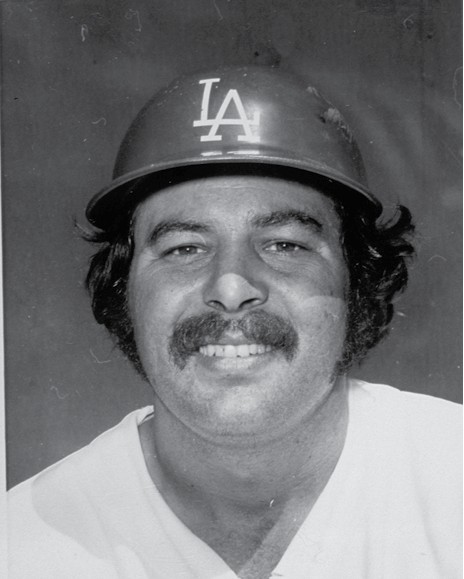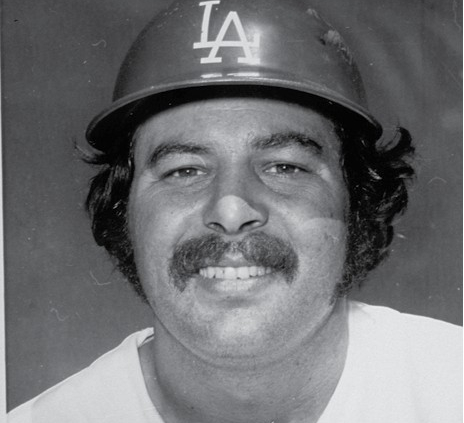October 12, 1974: Joe Ferguson’s fantastic throw only a footnote as Oakland wins World Series opener

Right fielder Joe Ferguson’s first career assist came on a key throw to home plate in the 1974 World Series. (SABR-Rucker Archive)
The first-ever all-California World Series pitted two contrasting teams. The two-time defending American League (and World Series) champion Oakland A’s featured a new manager and experienced teammates. The National League champion Los Angeles Dodgers, back in the Series for the first time since 1966, had a skipper in his 21st season with a team and a starting lineup with only one player in his 30s. Oakland took the first game thanks to one big blast, one small bunt, and three clutch but unusual pitching outings despite one memorable throw by a Dodger outfielder.
LA ace Andy Messersmith set down the A’s in order in the top of the first. Facing Ken Holtzman, the first pitcher to start three consecutive World Series since the Yankees’ Whitey Ford opened four (1961-1964), the Dodgers got the game’s first baserunner via a one-out single by Bill Buckner. With two outs, Holtzman picked Buckner off.
Reggie Jackson led off for Oakland in the top of the second. Jackson hit the first of nine homers he would hit against the Dodgers in four different World Series to put Oakland up 1-0. Joe Rudi singled before Messersmith retired the side.
Los Angeles had a promising start to the bottom of the second with Steve Garvey’s single and a walk to Joe Ferguson. The rally fizzled when Ron Cey hit into a 6-4-3 double play and Bill Russell grounded out.
With the advent of the designated hitter in 1973, Holtzman had only one regular-season plate appearance (a walk) in the two regular seasons since – although he doubled twice in the 1973 World Series. Leading off the third, Holtzman walked. After Bert Campaneris sacrificed, Messersmith struck out the next two batters.
In the bottom of the third, the first two hitters for the Dodgers reached again. Steve Yeager singled and Messersmith, who had a career-high .240 batting average in 1974, one-upped Holtzman by doing the same. But Holtzman retired the top three hitters in the LA order to maintain Oakland’s 1-0 lead.
Messersmith worked around a leadoff walk to Jackson in the top of the fourth, and Holtzman once again pitched into and out of trouble by getting Yeager on a force out after two-out singles by Cey and Russell.
In the top of the fifth, the A’s started a rally thanks to a double down the third-base line by World Series doubles-machine Holtzman (three two-baggers plus a homer in seven Series), who reached with one out. Messersmith wild-pitched Holtzman to third. Then, shockingly, “Campy dumped a two-two pitch to … Messersmith’s left. … Holtzman, off with the pitch[,] slid across home plate but he didn’t have to, because Messersmith had the play only at first base.”1 (Campaneris had finished seventh in the American League in 1974 with 11 sacrifices.)
“We play for two or three runs,” Jackson said after the game. “That’s why the squeeze was a good play at that time.”2 After the successful suicide squeeze, Bill North walked, but Yeager threw out the Oakland speedster, who had led the American League in stolen bases by a wide margin but was also caught stealing more than any other player.
Shoddy Oakland defense helped the Dodgers close the gap in the fifth. Campaneris’s error with one out allowed Davey Lopes to reach. Buckner singled to right, and Jackson’s error allowed Lopes to score from first. Holtzman walked Jim Wynn to push Buckner to second. First-year Oakland manager Al Dark had already displayed his boldness in the top of the frame with a suicide squeeze. He did so again by quickly taking out Holtzman, who had thrown just 71 pitches, and calling on closer Rollie Fingers.
In 76 appearances in 1974, Fingers had entered the game in the fifth inning or earlier only three times. Tellingly, two of those had happened in September, the last time on September 15 against Texas, Oakland’s closest competitor in the AL West. In that game, Fingers pitched the final 4⅔ innings. He earned the win, giving up three hits. Fingers performed similarly in this game with much more at stake.
Vin Scully said Fingers “looks like a man in search of a barbershop quartet.”3 He began his extended adventure by striking out Garvey before plunking Ferguson, a surprising development given that Ferguson had not been hit by a pitch in 430 plate appearances that season, and Fingers had faced 483 batters in 1974, hitting just Dave Chalk back on May 26. Fingers got Cey to fly out, concluding a consequential fifth inning with the A’s up 2-1.
Messersmith retired Oakland in order in the sixth and got his second bloop single in the bottom of the frame although he died on first. Gene Tenace singled to open the seventh. Dark’s sacrificial strategy failed when Ray Fosse bunted foul with two strikes. The move looked particularly peculiar since the two following batters, Dick Green and Fingers, seemed unlikely to drive Tenace home from second base. The game remained 2-1 heading into the seventh-inning stretch.
For the only time in the game, LA went down in order in the seventh. The A’s took a 3-1 lead in the eighth via Campaneris’s single, North’s sacrifice, and a throwing error by third baseman Cey that eluded Garvey, who hesitated after retrieving the ball. As a result, Sal Bando went to third, which set up the most superlative play of the game. Jackson skied to medium-deep right-center, apparently far enough to score Bando. Ferguson prevented the run. The right fielder cut in front of center fielder Wynn to make the catch and started a double play with a laser throw to Yeager, who blocked the plate. Remarkably, Ferguson had played 52 career games in right field for the Dodgers from 1972-1974 without an assist.
“It could possibly have been the greatest throw from such a deep position,” said Ferguson’s admiring manager, Walter Alston.4 Ferguson said, “I just couldn’t make a better throw. If it’s not perfect, Bando scores. [Yeager] didn’t have to move. Bando was out. But he gave Yeager a pretty good bump.”5
The managerial wheels picked up speed in the eighth. Dark replaced right fielder Jackson, who was nursing a hamstring injury, with Claudell Washington. Fingers walked Cey with one out before striking out Russell. Willie Crawford batted for Yeager and singled Cey to third. Von Joshua pinch-hit for Messersmith and grounded to Green, leaving the tying runs at the corners.
The indefatigable Mike Marshall, who had appeared in a record 106 games out of the bullpen during the regular season, relieved Messersmith for the ninth. Oakland threatened without hitting the ball out of the infield. Rudi bunted for a single. Tenace sacrificed Rudi to second. Fosse walked. With Green due, Dark brought in Jim Holt, who popped out. Marshall fanned Fingers, who needed just three more outs for the win.
Fingers got the first two on fly balls before Wynn “hit a drive that cleared the left field fence for a home run. [Rudi and North] leaped … and it was so close that both looked in North’s glove after the leap.”6 The game had nearly ended, but LA now trailed just 3-2. Garvey singled, and Tom Paciorek ran for him. Fingers had thrown an astounding and effective 68 pitches in relief. Dark decided that sufficed and replaced him. Four pitchers had earned saves for Oakland in 1974: Fingers (18), Paul Lindblad (6), Darold Knowles (3), and Blue Moon Odom (1). Ignoring Lindblad, Knowles, and Odom, Dark tapped Catfish Hunter, who had won 25 games in 1974 as a starter.
Hunter’s only career save in the regular season (and the only one in his 15-year career) had come in the second game of a doubleheader against Baltimore on June 16, 1968. He came in with one out in the eighth with Oakland up 6-4, got Frank Robinson to hit into a double play, and retired all three hitters in the ninth. Here, Hunter needed to get just one out albeit in his first relief appearance of any sort in nearly two years. “It was the seventh game of the World Series in ’72,” he said, “and I came in in the fourth … with the bases loaded, two outs. The first pitch hit the wall, the second one reached it – only … Rudi jumped and caught it. That’s the kind of reliever I was.”7
Hunter faced Ferguson. An Oakland scribe described the scene: “The first two pitches missed for balls as the 55,974 fans – largest crowd in the history of Dodger Stadium – roared with anticipation. The next pitch, a strike. The next pitch, right down the middle of the plate, a fastball capable of going great distances, instead fouled back by the muscular Ferguson. The last pitch, another fastball. Ferguson swung. And missed.”8 Hunter’s second and last career save sealed another World Series win for the A’s. Dark’s “brilliant”9 maneuverings and the big-time performances of stars Fingers, Hunter, and Jackson proved critical in the road win over the Dodgers, who, with 12 men left on base, fell one big hit short of victory.
Sources
In addition to the sources cited in the Notes, the author consulted Baseball-Reference.com.
https://www.baseball-reference.com/boxes/LAN/LAN197410120.shtml
https://www.retrosheet.org/boxesetc/1974/B10120LAN1974.htm
Notes
1 Ray Fitzgerald, “LA Caught in Squeeze,” Boston Globe, October 13, 1974: 45.
2 George Ross, “Dodgers Undone by Telegraphed Squeeze,” Oakland Tribune, October 13, 1974: 31.
3 The NBC broadcast of the game is available at youtu.be/xkdv1lBIXCE (accessed June 10, 2023).
4 Lowell Reidenbaugh, “Brawling A’s Land One on L.A. Chin,” The Sporting News, October 26, 1974: 3.
5 Ed Levitt, “Dodgers Take Loss In Stride,” Oakland Tribune, October 13, 1974: 33.
6 Peter Gammons, “A’s Mix It Up – Homer, Squeeze, Error – Win Opener, 3-2,” Boston Globe, October 13, 1974: 45.
7 Peter Gammons, “Catfish Feared ‘Gopher,’ Avoided Same,” Boston Globe, October 13, 1974: 46.
8 Ron Bergman, “The Fighting A’s Win First Round,” Oakland Tribune, October 13, 1974: 31.
9 Ed Levitt, “Last Series Here?” Oakland Tribune, October 13, 1974: 31.
Additional Stats
Oakland Athletics 3
Los Angeles Dodgers 2
Game 1, WS
Dodger Stadium
Los Angeles, CA
Box Score + PBP:
Corrections? Additions?
If you can help us improve this game story, contact us.


